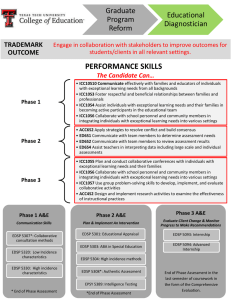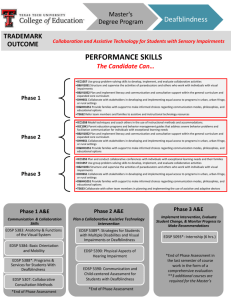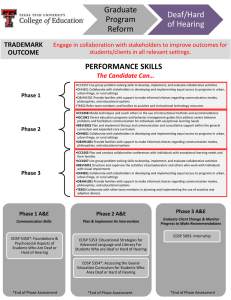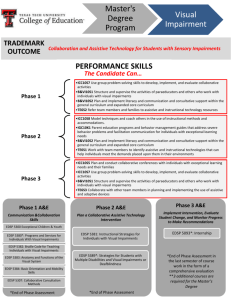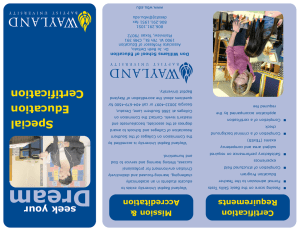Minutes of the Graduate Council February 4, 2003
advertisement
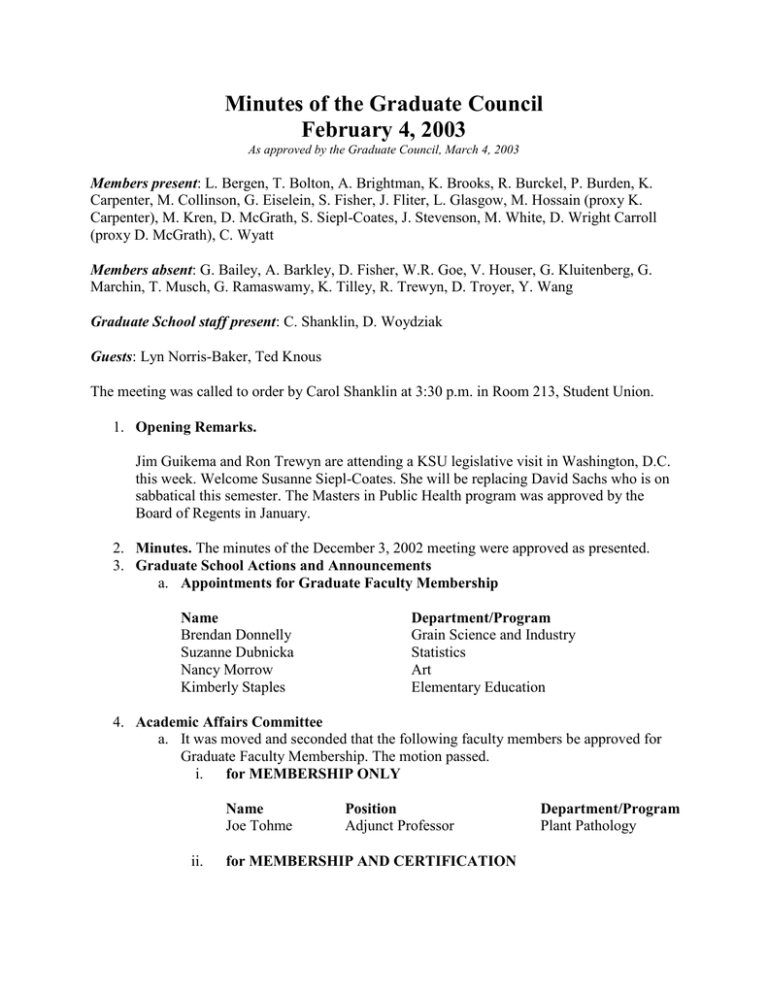
Minutes of the Graduate Council February 4, 2003 As approved by the Graduate Council, March 4, 2003 Members present: L. Bergen, T. Bolton, A. Brightman, K. Brooks, R. Burckel, P. Burden, K. Carpenter, M. Collinson, G. Eiselein, S. Fisher, J. Fliter, L. Glasgow, M. Hossain (proxy K. Carpenter), M. Kren, D. McGrath, S. Siepl-Coates, J. Stevenson, M. White, D. Wright Carroll (proxy D. McGrath), C. Wyatt Members absent: G. Bailey, A. Barkley, D. Fisher, W.R. Goe, V. Houser, G. Kluitenberg, G. Marchin, T. Musch, G. Ramaswamy, K. Tilley, R. Trewyn, D. Troyer, Y. Wang Graduate School staff present: C. Shanklin, D. Woydziak Guests: Lyn Norris-Baker, Ted Knous The meeting was called to order by Carol Shanklin at 3:30 p.m. in Room 213, Student Union. 1. Opening Remarks. Jim Guikema and Ron Trewyn are attending a KSU legislative visit in Washington, D.C. this week. Welcome Susanne Siepl-Coates. She will be replacing David Sachs who is on sabbatical this semester. The Masters in Public Health program was approved by the Board of Regents in January. 2. Minutes. The minutes of the December 3, 2002 meeting were approved as presented. 3. Graduate School Actions and Announcements a. Appointments for Graduate Faculty Membership Name Brendan Donnelly Suzanne Dubnicka Nancy Morrow Kimberly Staples Department/Program Grain Science and Industry Statistics Art Elementary Education 4. Academic Affairs Committee a. It was moved and seconded that the following faculty members be approved for Graduate Faculty Membership. The motion passed. i. for MEMBERSHIP ONLY Name Joe Tohme ii. Position Adjunct Professor for MEMBERSHIP AND CERTIFICATION Department/Program Plant Pathology Name Manuel Moro Position Assistant Professor Department/Program Diagnostic Medicine/Pathobiology b. Non-Graduate Faculty to teach Graduate Courses (One-Year Approval) Name Mohammad Zaher Department/Program Economics Courses ECON 681 Term U03 c. Course and curriculum changes: It was moved and seconded by consent to approve the following course changes, deletions, and additions. The motion passed. i. CHANGE: ASI 802. Gametes, Fertilization and Pregnancy in Farm Animals. (3) II, in odd years. Basic mechanisms of gamete production and fertilization, embryonic and fetal development, and the establishment, maintenance and termination of pregnancy. Two hours lec. and three hours lab a week. Pr.: BIOCH 521. ASI 802. Gametes, Fertilization and Pregnancy in Farm Animals. (3) I, in odd years. Basic mechanisms of gamete production and fertilization, embryonic and fetal development, and the establishment, maintenance and termination of pregnancy. Two hours lec. and three hours lab a week. Pr.: BIOCH 521. ASI 826. Nutritional Physiology. (3) II. The course focuses on the structures and function of the gastrointestinal tract, with an emphasis on digestive physiology in the small intestine. Details of gastrointestinal tract secretion, regulation, digestion, and absorption of the major nutrient groups are emphasized with species comparisons. Three hours rec. a week. Pr.: BIOCH 521. ASI 826. Nutritional Physiology. (3) II, in odd years. The course focuses on the structures and function of the gastrointestinal tract, with an emphasis on digestive physiology in the small intestine. Details of gastrointestinal tract secretion, regulation, digestion, and absorption of the major nutrient groups are emphasized with species comparisons. Three hours rec. a week. Pr.: BIOCH 521. CNS 640. Construction Operations. (3) I, II. Shop drawing and submittal processes, field and office practices, change orders, construction safety standards and practice, preconstruction planning, expediting, short-interval planning. Two hours rec. and three hours lab a week. Pr.: CNS 325 and 540. Conc.: CNS 641. CNS 640. Construction Operations. (3) I, II. Shop drawing and submittal processes, field and office practices, change orders, construction safety standards and practice, preconstruction planning, expediting, short-interval planning. Two hours rec. and three hours lab a week. Pr.:CNS 641, CNS 642, and CNS 645. CNS 645. Construction Scheduling and Cost Control. (2) I, II. Construction cost reporting and control. Construction planning, both long-term and short-interval, construction scheduling, monitoring, and controlling. Computer applications. One hour rec. and two hours lab a week. Pr.: CNS 640, 641, and 642. CNS 645. Construction Scheduling and Cost Control. (2) I, II. Construction cost reporting and control. Construction planning, both long-term and short-interval, construction scheduling, monitoring, and controlling. Computer applications. One hour rec. and two hours lab a week. Pr.: CNS 540 and concurrent enrollment in CNS 641. ARE 690. Senior Project. (3) I, II. Student working individually with laboratory support will prepare and present a project of appropriate scope and complexity with emphasis on structural, mechanical, acoustical, electrical and lighting requirements. Nine hours lab a week. Pr.: ARE 523, 524, 528, 532, 537, 590. Must be taken concurrently with ARE 539, Architectural Engineering Management. ARE 690. Senior Project. (3) I, II. Student working individually with laboratory support will prepare and present a project of appropriate scope and complexity with emphasis on structural, mechanical, acoustical, electrical and lighting requirements. Nine hours lab a week. Pr.: ARE 523, 524, 528, 532, 537, 590, CE 522 and concurrent enrollment in ARE 539. ARE 710. Building Energy Analysis. (V) I. Study of building energy consumption and current modeling techniques to analyze overall energy usage including: auditing of existing buildings, economic evaluation and energy efficient system selection for new construction. Two or three rec. hours a week. Pr.: ARE 534. ARE 710. Building Energy Analysis. (2) I. Study of building energy consumption and current modeling techniques to analyze overall energy usage including: auditing of existing buildings, economic evaluation and energy efficient system selection for new construction. Two hours rec. a week. Pr.: ARE 640 or instructor permission. ARE 780. Theory of Structures IV. (3) II. Continuation of Theory II and III, with special emphasis on the complete problem of the structure as a whole. Three hours a week. Pr.: CE 537 and 523, 524, and 528. ARE 780. Advanced Structural Topics. (3) II. Continuation of Steel Structures and Reinforced Concrete Structures, with special emphasis on the complete problem of the structure as a whole. Three hours a week. Pr.: ARE 524 and ARE 528. EDSP 842. Interventions: Emotional and Behavioral Disorders. (3) I, S. Educational EDSP 742. Interventions: Emotional and Behavioral Disorders. (3) I, S. Educational ii. planning assessment, instructional methods, curricular modification, media and materials, teacher competencies, and model programs for students with emotional and behavioral disorders. Pr.: EDCEP 315 or EDSP 710. planning assessment, instructional methods, curricular modification, media and materials, teacher competencies, and model programs for students with emotional and behavioral disorders. Pr.: EDCEP 315 or EDSP 710. EDSP 843. Interventions: Academic Disabilities. (3) II, S. Educational planning, instructional methods, and curricula modifications for students with academic learning disabilities. Pr.: EDCEP 315 or EDSP 710. EDSP 743. Interventions: Academic Disabilities. (3) II, S. Educational planning, instructional methods, and curricula modifications for students with academic learning disabilities. Pr.: EDCEP 315 or EDSP 710. EDSP 885. Practicum in Education of Exceptional Individuals. (1-6) On sufficient demand. Observation and participation in teaching exceptional individuals under the supervision of selected teachers in special education programs. Pr.: EDSP 841 or EDSP 842 or EDSP 843 or EDSP 846. EDSP 785. Practicum in Education of Exceptional Individuals. (1-6) On sufficient demand. Observation and participation in teaching exceptional individuals under the supervision of selected teachers in special education programs. Pr.: EDSP 841 or EDSP 842 or EDSP 843 or EDSP 846. HORT 751. Human Issues in Horticultural Therapy. (3) I. New developments and applications of gardening or horticultural activities for special populations will be emphasized. Procedures for management of horticultural therapy programs, designing therapeutic or rehabilitation activities, and evaluation methods will be discussed. Reading of selected research publications relating to horticultural therapy will be assigned. Three hours rec. a week. Pr.: HORT 525 and a course in statistics. HORT 751. Human Issues in Horticultural Therapy. (3) I, in odd years. New developments and applications of gardening or horticultural activities for special populations will be emphasized. Procedures for management of horticultural therapy programs, designing therapeutic or rehabilitation activities, and evaluation methods will be discussed. Reading of selected research publications relating to horticultural therapy will be assigned. Three hours rec. a week. Pr.: HORT 525 and a course in statistics. DROP: EDSP 721. Characteristics of Learning Disabilities. (3) II. An explanation of important concepts and practices in the area of learning disabilities. Emphasis will be placed upon diagnosis of underlying causes and their characteristics. Pr.: EDSP 323 or 324, and EDCEP 315. EDSP 724. Characteristics of Mental Retardation. (3) I. Etiological, psychological, sociological, and educational aspects of mental retardation. Pr.: EDSP 323 or 324, and EDCEP 315. iii. NEW: ARE 623. Timber Structures. (3) I. Analysis and design of timber structures including dimension lumber, glu-lam members, and engineered wood products. Three hours rec. a week. Pr.: CE 537 and ARE 522. CS 747. Systems Integration of Small Animal Internal Medicine. (2) II. Elective course in small animal internal medicine. This course will provide in-depth learning of complex issues regarding case management of the canine and feline patient with an integrated systems approach. The course will also introduce controversial and emerging topics in small animal internal medicine. Pr.: CS 709 and CS 711. EDSP 725. Characteristics of Cognitive Disorder. (3) I, II. Etiological, psychological, sociological, and educational aspects of cognitive disabilities. Pr.: EDSP 323 or 324, and EDCEP 315. FSHS 775. Perspectives in Gerontology. (3) I, II, S (Upon demand). Exploration of basic concepts in gerontology through current and classic research. Themes and issues include stereotypes and myths of aging, theories of aging, research approaches in aging, and related social issues facing the elderly. FSHS 776. Program Evaluation and Research Methods in Gerontology. (3) I, II, S (Upon demand). Overview of program evaluation, research methods, and grant writing in gerontology. Includes application of quantitative and qualitative methods in professional settings. FSHS 777. Public Policy: Economic and Social Impacts on Older Adults. (3) I, II, S (Upon demand). Study of policy development and public policy programs associated with aging. Attention is given to the impact of policies on older adults and economic impacts of and for an aging population. FSHS 778. Aging and the Family. (3) I, II, S (Upon demand). Investigates the issues that relate to family life in the later years from the perspective of older adults, the family and society. FSHS 779. Professional Seminar in Gerontology. (3) I, II, S (Upon demand). Students apply and integrate knowledge gained in earlier courses and strengthen skills in ethical decisions-making through applications in gerontology-related areas such as advocacy, professionalism, family and workplace issues. Students from a variety of professions bring their unique perspective to bear on topics of common interest. FSHS 867. Pre-Practicum in Marriage and Family Therapy I. (1) I. Introduction to master's program in marriage and family therapy, including clinic policies and clinical observations. Restricted to students admitted to the marriage and family therapy program. Pr.: Concurrent enrollment in FSHS 853 and FSHS 878. FSHS 868. Pre-Practicum in Marriage and Family Therapy II. (1) II. Preparation for screening into the clinical practicum in marriage and family therapy and participation in clinic research program. Pr.: FSHS 867 and concurrent enrollment in FSHS 870. iv. Graduate Certificate proposal Gerontology within the M.S. in Family Studies and Human Services A motion was made and seconded to approve this new graduate certificate program. Following discussion with guest, Lyn Norris-Baker, this program passed unanimously. v. Graduate Specialization proposal Gerontology within the M.S. in Family Studies and Human Services A motion was made and seconded to approve this new graduate specialization program. Following discussion with guest, Lyn NorrisBaker, this program passed unanimously. 5. Graduate Student Affairs Committee Greg Eiselein (chair) gave updates on the current issues the committee has been discussing. Actions concerning the graduate student honor code survey and electronic theses and dissertations will be presented to the Council in the near future. 6. Graduate School Committee on Planning Tim Bolton (chair) reported the committee proposes a first reading for the Concurrent Bachelor's/Graduate Degree Program Guideline. This guideline is to appear as an appendix in the Graduate Handbook and in the undergraduate catalog. The discussion generated suggestions to incorporate and reconsider for the next meeting. 7. Graduate Student Council Information Sarah Fisher, President, provided updates on current issues. 8. University Research and Scholarship Ted Knous, Associate Vice Provost, provided an update on available research opportunities. All faculty are encourage to take advantage of the Community of Science c.v. database for electronic information on available grants related to faculty research. See the ORSP website for more information. Council was adjourned at 4:45 p.m.
